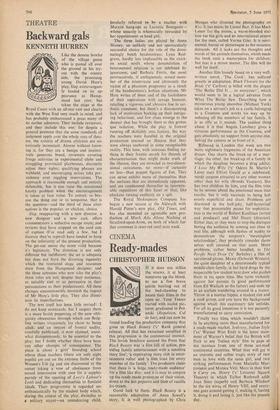THEATRE
Backward gals
KENNETH HURREN
Like the demon bowler of the village green who is pasted all over the ground in his try- out with the county side, the promising young David Hare's play, Slag, extravangant- ly lauded on its ap- pearance at Hamp- stead last year, has taken the stage at the Royal Court with an all-star cast and clearly with the West End very much in mind, and has probably embarrassed a great many of its earlier admirers. They include reviewers, and they include this one; for despite a general pretence that the same standards of judgment apply over the whole area of thea- tre, the criteria of drama criticism are no- toriously inconstant. Almost without know- ing it, for they are a benign and instinct- ively generous breed, reviewers covering fringe activities in experimental clubs and struggling provincial playhouses, discreetly adjust their sights; qualifying phrases are withheld, and encouraging noises take pre- cedence over niggling reservations. The approach is reasonable enough and entirely defensible, but it can raise the occasional knotty problem when the encouragement is taken at face value. To retract, to bra- zen the thing out or to temporise, that is the question—and the third of these alter- natives is the popular, or chicken, choice.
Slag, reappearing with a new director, a new designer and a new cast, offers commentators a seductive escape route.; .and reviews that have stopped on the cool side of rapture (I've read only a few, but I daresay they're typical) have tended to harp on the inferiority of the present production. The get-out seems the more valid because it's legitimate. The direction is not only different but indifferent; the set is adequate but does not have the diverting ingenuity which the restricted stage and resources drew from the Hampstead designer; and the three actresses who now take the play's three roles are not, despite their eminence, as suitably cast or as persuasive in their personations as their predecessors. All these changes unquestionably diminish the impact of Mr Hare's little play. They also illumi- nate its imperfections.
The text itself has been little revised: I do not keep scorecards, but I suspect there is a more lavish peppering of the now obli- gatory obscenities through which our fledg- ling writers vivaciously lay claim to being adult, and an instant of frontal nudity, carefully publicised, is now claimed, some- what disingenuously, to be essential to the play; but I doubt whether there have been any other changes of consequence. The piece is about a girls' boarding school whose three teachers (there are only eight pupils) are out on the extreme limbs of the Women's Lib jig and are discovered at the outset taking a vow of abstinence from sexual intercourse with men (in a sapphic parody of the opening of Love's Labour's Lost) and dedicating themselvis to feminist ideals. Their programme is regarded un- enthusiastically by the student body which, during the course of the play, dwindles to a solitary stayer—an unendearing child,
jocularly referred to by a teacher with Marxist hang-ups as Lucretia Bourgeois— whose tenacity is whimsically rewarded by her appointment as head girl.
The three ladies are played by Anna Massey, an unlikely and not spectacularly successful choice for the role of the domi- natingly butch headmistress; Lynn Red- grave, hardly less implausible as the strick- en social misfit whose denunciation of heterosexual relations is not inhibited by ignorance; and Barbara Ferris, the most provocatively, if ambiguously, sexual mem- ber of the triumvirate and ultimately the victim of a phantom pregnancy as a result of the headmistress's lesbian attentions. Mr Hare writes of them and of the foolishness of their aspirations with savage humour, retailing a vigorous and abrasive line in sar- donic comment, but there's a disconcerting lack of motivation backing up their intrigu- ing behaviour, and few clues emerge to the despair that has brought them to this grotes- que isolation. While the play is forever running off skittishly into fantasy, the way the teachers were handled in the original production created an illusion that they were always anchored in some recognisable reality. This time, with actresses finding no- thing in their frantic search for threads of characterisation that might make truth of the illusion, they are revealed as two-dimen- sional caricatures, no more—if certainly no less—than puppet figures of fun. They can never exhibit more of themselves than the surfaces that are immediately apparent, and are condemned thereafter to intermin- able repetitions of this facet or that, like chickens turning endlessly on a spit.
The Royal Shakespeare Company has begun a new season at the Aldwych with Harold Pinter's new play, Old Times, and has also mounted an agreeable new pro- duction of Much Ado About Nothing at Stratford-upon-Avon, on both of which fur- ther comment is reserved until next week.


































 Previous page
Previous page